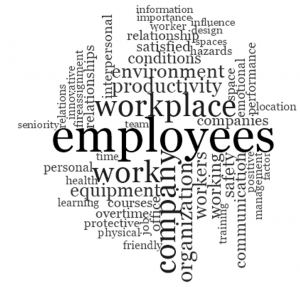Being happy at work makes us more productive?
Category : News
Within the framework of the Erasmus+ project Renewal-Real Estate New Alternative Skills, the partnership has run a survey in order to analyze good practices in the workplace management, and how this affects workers and their labour results. 443 questionnaires were filled in by employees of local companies and public organizations in 6 EU countries (Bulgaria, Cyprus, Greece, Italy, Portugal and Spain) has been interviewed. There were 49 companies, being represented a labour force of 12,942 people (results from the survey can be downloaded here).
After analyzing all the data we can say that our study’s population was well balanced in regards to the gender; a quarter of the employees are at least 45 years old; the majority have a graduate degree; mainly with a seniority of more than 10 years and are mostly general workers, that is not from the managerial, supervisory or production working areas. Portugal and Italy are the only countries with a balanced distribution of workers in regards to gender. Bulgaria, Greece, Spain and Cyprus have a workforce of about 40% females and 60% males.
From our analysis, it was clear that the relationship between employees and superiors affects either positively or negatively the productivity. If the employees and superiors have a good professional relationship the productivity can increase; on the other hand, if their relationship is not good, the productivity can certainly be decreased. This happens because when workers on the same company have good professional relationships, the work environment is good, consequently increasing productivity. Team work, trust, respect, loyalty, cooperation, honesty, openness were the adjectives most used by the interviewees to characterize a healthy collaborative workplace.
When being asked about the fair treatment in the workplace, almost all of the respondents said that treating their employees fairly was of extreme importance. Only a few interviewees have the idea that the treatment must depend on the position each employee plays in the company.
Regarding the communication system, the opinions are a little divided. The majority of the respondents said that their company has an open communication system (informal), in which the employees are able to freely communicate with their superiors. On the other side, there were a few respondents that said that the communication must be hierarchical (formal), the employee must communicate with his supervisor which in turn communicates with the manager if needed.
In relation to the employee’s attitude at the workplace being affected by some factors, like interpersonal relations, emotional factor, job assignment, overtime duty and extended work, almost all of the respondents agree that interpersonal relations, working conditions, emotional factors are all very important and affect productivity.
Concerning the physical aspects that influence the performance of the employees at the workplace the respondents gave the following answers: open space, social room, gym, garden, natural light, outdoor space, number of employees in one room, kitchen, furniture, modern design, storage, clean spaces, relaxation spaces, break rooms, plants and accessibility. Respondents from Cyprus said that either the question does not apply to their companies or that for their employees the only thing that matters is the salary.
Regarding the importance of the physical layout of the office to maximize productivity, all respondents agreed that indeed the physical layout can play a big role in productivity.
In relation to the effect that the workplace environment (innovative design, eco-friendly, and wellness inclusive design) has on the collaborative and innovative work environment, some of the respondents agree that it has a positive effect and that it is very important. The other respondent either stated that it is not a priority in their company, or that it does not apply to their company.
In regard to the employees’ satisfaction with the behavioural factors (interpersonal relationships, emotional factors, job assignment, overtime and extended work), all but four respondents answered affirmatively. Most say that their employees show satisfaction in their activity, good results and productivity. The four respondents that answered negatively are from Spain and state that the overtime and the workload situations should be improved, and administrative work should be done by administrative personnel.
Below, in figure 1, there is a representation, in the form of a word cloud, of the responses from the questionnaires. Words used most often appear bigger and bolder. This figure is a good way to summarize the central concepts of workplace management.
Figure 1: Word clowd about workplace management
As a general conclusion, it can be stated that a suitable work enviroment helps to reduce laboral absentism and increases the productivity. In order to improve the productivity, it seems to be mandatory the transition to an agile workplace, this is, a work team based on trustness and collaboration, where people can work everywhere at everytime, and integrated, agile and collaborative relationships (Delloite, 2016)




 Español
Español